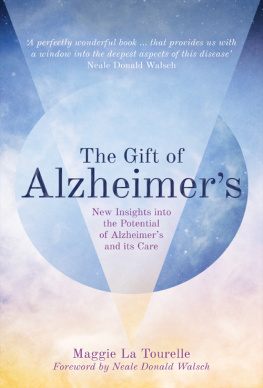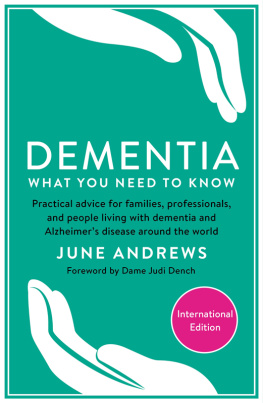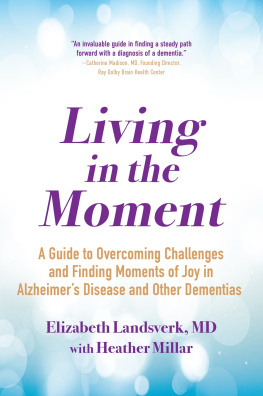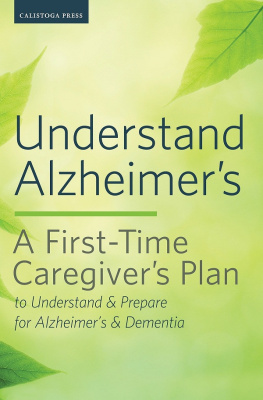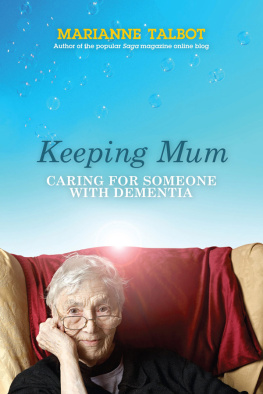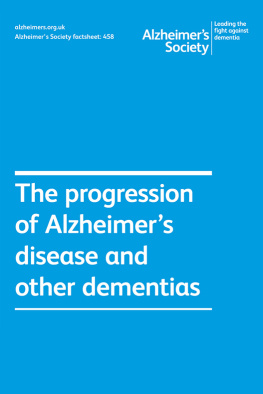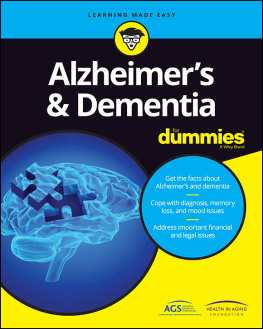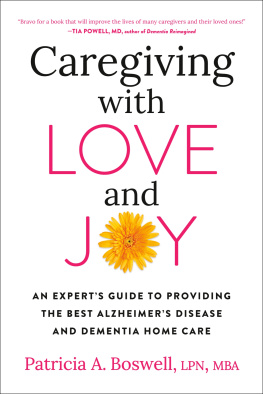A Deeper Perspective on Alzheimers and Other Dementias
DEDICATION
Dedicated to those individuals whose lives are touched by dementia, and their families and friends.
A Deeper Perspective on Alzheimers and Other Dementias
Practical Tools with Spiritual Insights
Megan Carnarius, RN, NHA, LMT

Megan Carnarius, 2015
The right of Megan Carnarius to be identified as the author of this work has been asserted by her in accordance with the Copyrights, Designs and Patents Act of 1998.
ISBN: 978-1-84409-662-6
All rights reserved.
The contents of this book may not be reproduced in any form except for short extracts for quotation or review, without the written permission of the publisher.
A CIP record for this title is available from the British Library.
With special thanks to Ken Cohen for the permission to quote from his book Honoring the Medicine: The Essential Guide to Native American Healing (Ballantine Books, 2003) in Chapter 15 (The Medicine Wheel) of this book.
Artwork by Megan Carnarius
Artwork digitized by Emily Snyder
Photographs by Liza Weems
Edited by Nicky Leach
Cover design by Richard Crookes
Interior design by Joan Pinkert
Printed and bound in the EU
Published by
Findhorn Press 117121 High Street
Forres IV36 1AB,
Scotland, UK
t+44 (0) 1309 690582
f+44 (0) 131 777 2711
e
www.findhornpress.com

DISCLAIMER
The information in this book is given in good faith and is neither intended to diagnose any physical or mental condition nor to serve as a substitute for informed medical advice or care. Please contact your health professional for medical advice and treatment. Neither author nor publisher can be held liable by any person for any loss or damage whatsoever which may arise from the use of this book or any of the information therein.

Contents

Preface
This year is my 25th anniversary of providing care for, and working specifically with, individuals diagnosed with some type of dementia. Over many years of designing programs and facilities and managing these environments, I have worked with hundreds of families, professional caregivers, and individuals with this challenge, and many of those attending my lectures and trainings started requesting that I write a book.
I view myself as someone who is a roll-your-sleeves-up kind of person, so writing a book has been a challenge. To get it to the finish line, its taken me 14 years, using snippets of time outside of work, while continuing to learn and have the usual ups and downs that life tends to provide. My hope is that this book will be useful to family caregivers as well as professionals in this field, and that individuals in the early stages of a dementia diagnosis will find it helpful as well.
This book is about understanding some of the deeper lessons we are exposed to through caring for individuals with Alzheimers disease and other dementias. We all want a cure. But in the meantime, while this illness is still with us, how can we create a quality of life for each person in each stage of the disease? How can we look deeper into situations that at first glance look hopeless and destructive in order to find opportunities for insight, inspiration, and greater understanding of ourselves and those we love? How can we allow the full measure of the experience to unfold and be felt with as much of ourselves as we can bring to bear?
Soul-searing, life-testing situations have what some call fallout blessings. For example, we dont want emergencies, but we certainly are glad that someone knows what to do when we do have them. Without emergencies, a paramedic or emergency nurse would not be able to experience his or her developing skills and abilities to be of service to others. Some prior crisis helped them in navigating the current moment, redirecting it to stable ground.
These silver linings, unexpected graces, or Yods as they are known in the Hebrew tradition, can sometimes take a long time to reveal themselves, or a long time to germinate in us. They can also manifest synergistically, becoming quickly visible and profoundly understood. Whether its a complicated emergence or a seemingly orchestrated lightning bolt, these blessings are often life-affirming and have an objective, substantive impact. They change our lives.
My wish for those who care for those of us going through the difficult dementia journey is that we strive, through the tumultuous waves, to remain awake and open to the blessings of that journey. We are in a vocation in which the gifts brought to us by others can be fully appreciated and recognized, so that this soul-searing experience offers a growth/initiatory process that opens our hearts, nurtures our compassion, and ultimately enables us to be better human beings.
My wish for those brave individuals living with memory loss illnesses is that they be supported and allowed to live their experience fully in their own unique way, to recapitulate, to express, to love and be loved, and to be sheltered from harm. In later stages, they are no longer involved in mundane worldly existence and are in a deep, internal state that we as caregivers generally cannot reach into and share. Dementia has built a wall around them, as if they have entered a cloister. Rather than think of this wall as an imprisonment, I view it as a final honoring of the life this individual has led and of the body or vessel that housed them. Allowed to cocoon, it affords the time needed for the soul to attend to deeper aspects of the self on a spiritual level.
My last hope is that in the final stages, when ready, the individual can let go and be allowed to let go, when they know its time.
Chapter 1

The Foundation and Vision of Memory Care
Dementia is defined as severely impaired memory and reasoning ability, usually with disturbed behavior associated with damaged brain tissue. Just as a bone can be malformed at birth, or injured through life experience, the brain also can be malformed initially or injured or altered along the way, making abilities or disabilities occur.
The disease has been part of human experience for a very long time. It undoubtedly occurred prior to recordkeeping, but there are recorded incidences of it in Egyptian and Greek writings.
Cultures have responded in various ways to brain anomalies, and there is a definite correlation between a cultures established, stabilized functioning and its ability to accept and allow demented individuals to coexist in the community. In cases where the survival of the group depended on how productive the individual was and how crucial their contributions were, as in nomadic tribes, they did not have the luxury of sustaining a noncontributor.
Generally, the religious beliefs and faith of these groups grew out of the natural environment and forces influencing their lives. Typically, there was an underlying belief that the spirit world was not set apart from life but was another stage of life. There are stories from native cultures of persons moving into a meditative state and letting go of life by collapsing their lungs through a specific breathing technique, or isolating themselves, drifting off on floating ice, or staying behind as their nomadic group moved on. The urgency of earthly participation and needs drove elders to move on, or in some cases perhaps to wander off and not return.
Next page

